
No.6 28th June, 2024
Hi,
This is the last magazine for a few weeks over the summer break with the potential for a Summer Special edition early Aug.
So, the timing is such that this week you will find a couple of reflections both on the Summertime and the forthcoming election and then some things to watch over the next few weeks including the latest Summer box office movie.
Look out for details of the Community Week in a few weeks time and get along to the events when you can - esp the Friday evening all age event which will be great I'm sure.
Enjoy the mag....and enjoy your Summer.
M

Sunday 30th June, 10.30am
Morning Service with Communion
Scripture - Romans ch12
LARGE PRINT
If you would prefer to have a large print copy of the song words which appear on the screen on a Sunday morning let the door team know.
We don't want to print copies which aren't used so just the team know and we can organise that for you.
If you require a lift to get to church email office@nmnewchurch.org
Songs for Sunday
Occasionally we have a link here for a new song so you can have a listen before Sunday - we have had some kids ones recently, but this link is for one we know...O Great God of Highest Heaven.
This is a men's choir singing it beautifully - fantastic tune and lyrics.
O great God of highest heav'n
Occupy my lowly heart
Own it all and reign supreme
Listen and watch here.
Come to the Feast!

We are not actually singing this song on Sunday but
Vagabonds has a great story behind it as well as great lyrics as we head into Communion on Sunday.
"Come all you fallen, and come all you broken,
Find strength for your body and food for your soul.
Come to the feast,
There is room at the table.
Come let us meet in this place.
With the King of all kindness
Who welcomes us in,
With the wonder of love,
And the power of grace."
Here is a link to Stuart Townend explaining the story behind the song...and you can listen to the song
here.
Wearing Gospel-Gore-Tex When It’s Raining Biting Flies
SCOTTY SMITH
“As God’s chosen people, holy and dearly loved, clothe yourselves with compassion, kindness, humility, gentleness and patience.” Col. 3:12
Dear Jesus, in the little “t” trauma department, I have ouch-memories of biting flies raining down on our family picnic on the beach.
Every time we’d reposition up the coast, they’d follow us, intent on making us their picnic.
Our bug spray seemed liked honey to them, as they continued to bite, sting, and gnaw. Our only recourse was to go inside.
Well, there are human-biting-flies too, but you don’t intend us to live life on the defensive or always inside. So you’ve given us Gospel-Gore-Tex to wear all the time—whether it’s raining human-biting flies, two-legged piranha, or people-ticks.
As your “chosen, set-apart, and dearly loved” Bride, we are to clothe ourselves with 5-layered grace on a daily basis. “Compassion, kindness, humility, gentleness and patience”—these grace-garments are never out of style, breathable but warm, and are very comfortable when worn next to the heart. They serve us well in every setting, every day.
Like when we’re the target of unjust criticism of passive aggressive spite. Or when a pop-up storm of the devil’s condemning work dumps on us. Or when we step into someone’s really hard day, week, or life… and we become the outlet for their shame, anger, and sadness.
All metaphors and analogies aside, Jesus, this is serious stuff. How we love, react, and respond matters—whether we are receiving criticism, OR are the agents of it. You have told us “the only thing that counts is faith expressing itself in love” (Gal. 5:6). Help us Jesus, big time, help us. Help us receive feedback non-defensively and give feedback lovingly. But don’t let any devilish judgmentalism enter our spirit. So Very Amen.
Letter from the Manse

Dear Congregation,
The schools are off now and I know some of you are already away on holiday! I really hope you have a lovely break.
Physical and emotional resting is part of God’s design for us. We need it. The Lord gifted His people one day a week to recuperate (we tend to call it "The Sabbath"). It is still important today to carve out time for rest on a Sunday. Scotland is certainly a different place to God’s Old Testament Israel. However, the people of God were given the command to rest not only in the Promised Land but also on their way to the land. A day to rest was never meant as a burden to God's people but as a good necessary provision. As we heard during our recent all-age service from Psalm 139, the Lord knows us inside out!
We I be right in saying that we often think of a Sabbath as a burden? If true, I suspect this is the case because it takes a very practical faith in the Lord to have a day off. Without trusting Him for the very basics of life, we tend to think their acquisition lies entirely on our shoulders. That somehow it is only our own hands that will keep us alive! It takes a very practical faith in the Lord to stop working for a day; to rest and trust that the Lord will provide.
In Exodus chapter sixteen, some of the people did not rest on the 7th day. they went out to get manna as they had done each other day of the week. It does not tell us why they did this. Did they go out because they did not take God’s Word seriously? Did they think God had given them a suggestion rather than a command which was good for them? Did they lack faith and think they could not trust God to provide when they rested? Were they simply greedy? It does not tell us their reasoning. However, what it does tell us is that thinking to rely on their own energy and intellect to secure their food, they failed. Scheduling their lives their way and not God's simply cost them.
In Chapter 16.27-30 the Lord confronts Moses:
“How long will you refuse to keep my commandments and my laws. See! The Lord has given you the Sabbath; therefore on the sixth day he gives you bread for two days. Remain each of you in his place; let no one go out of his place on the seventh day.” So the people rested on the seventh day.
The Sabbath is such a rich source of blessing to us. It was not only for physical benefit. Resting from normal work means having time to spend with family, with friends and importantly, in Christian fellowship. Our bodies, minds and relationships benefit from having a day off.
However, the 7th day was gifted as a day of rest for another most significant reason. In Exodus 20:10, the 4th commandment says “…the seventh day is a Sabbath to the Lord your God”.
This was to be a day when the people turned deliberately from work to the Lord!
This takes faith also. It presses to ask whether we think we need a special day each week to have a healthy walk with God. The answer given clearly by the 4th Commandment is that we do. We are duty-bound to deepen this relationship. However, how amazing is it that God gives us a schedule each week to deepen the relationship He wants with us? That is grace! We may think of this only is in a private/personal way, but originally the command was given to the people as a nation. We orientate our thinking towards Him not only in our own private devotions but importantly in our shared worship (as we gather as the church).
I think many of us have had seasons in the past when we have been very intentional in keeping the Sabbath. I think some of us would confess to having lost our way on this. It is true that some of us cannot easily control the patterns of our working life. Because of this, keeping a specific day as “Sabbath” can be hard. However, when we are able, I wonder if this summer season is a good time to re-commit ourselves to that which the Lord not only commands but "gifts" to us, a wonderful day of rest.
The final reason God gave us this wonderful day is because every week it is a reminder of the eternal rest promised to all who trust in Jesus. At that time our bodies will not need the same recuperation. At that time God will be immediately present.
If you are on holiday or planning one, could you be very intentional in how you structure your Sunday - even if no one else around you is? How about sourcing a good church to worship in? Take our greetings from Mearns Free Church with you! Do research before you go on holiday. Find the nearest good church and even if it is a distance not only will it be wonderful to join another part of God’s family in worship, but you will also get to see more of the area you are holidaying in! And, of course, later you can worship with us from the recording of our service. That is a win, win, win!
I do hope you have a lovely time and come back refreshed not in body and soul.
I am praying for this for you…
Warmest regards,
Scott

Over the Summer the prayer meeting will continue to run informally at the Manse.
Wednesdays 7.15-8.15pm.
Speak to Scott for more details or if you are not sure how to get there.
Family Picnic at Dean Castle!
Thanks to all those who planned the Church family trip last Sunday -
Age-wise I think most decades were represented from Thane Jnr, right up to...well...people who enjoyed a seat during the tug of war!

Chiara and Grace going head to head in this challenge - Cara holding on so not to get blown across to Kilmarnock.
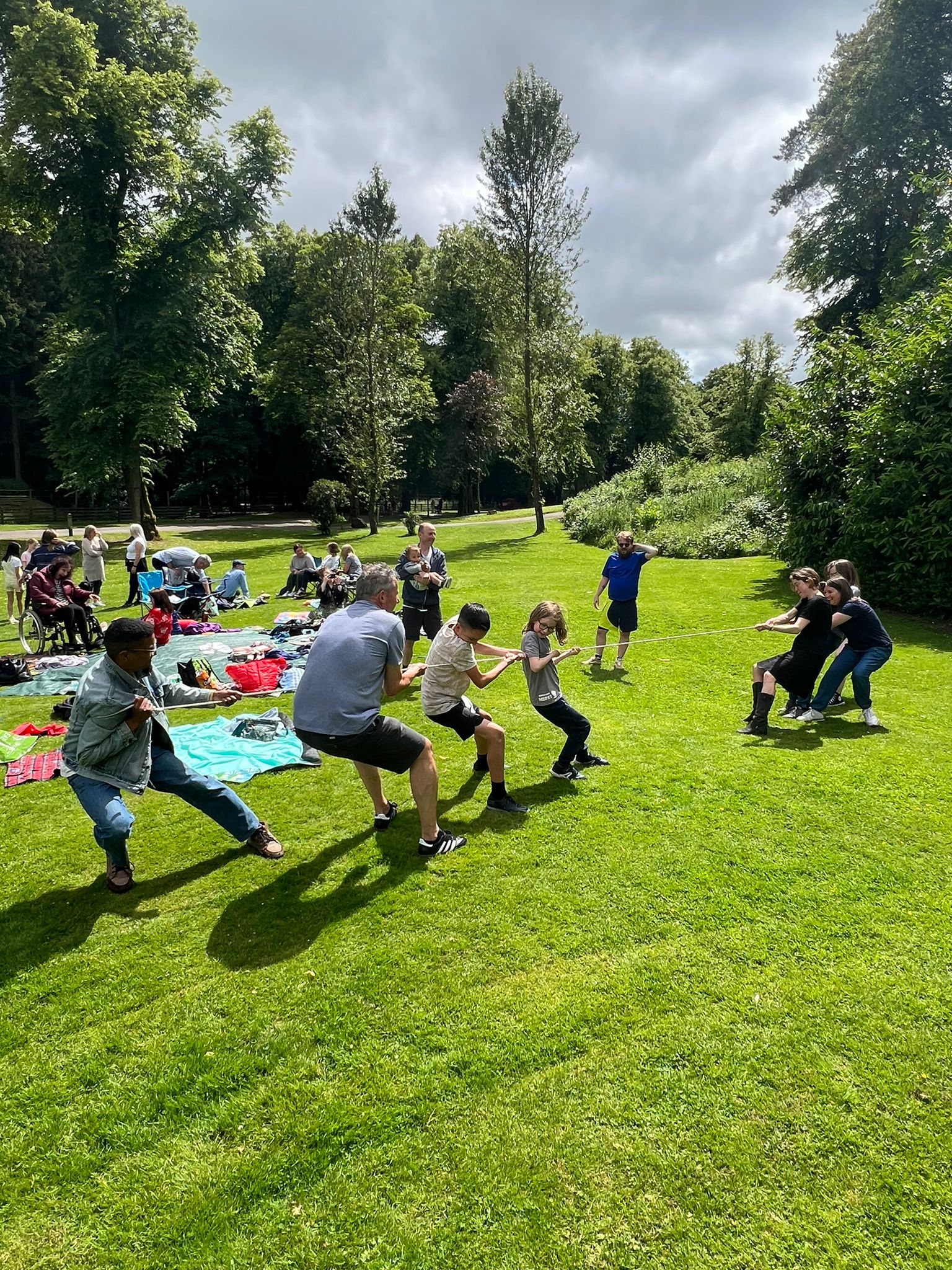
The boys are under pressure here... it will all be sorted out when Jacob, Colin and Scott get involved!
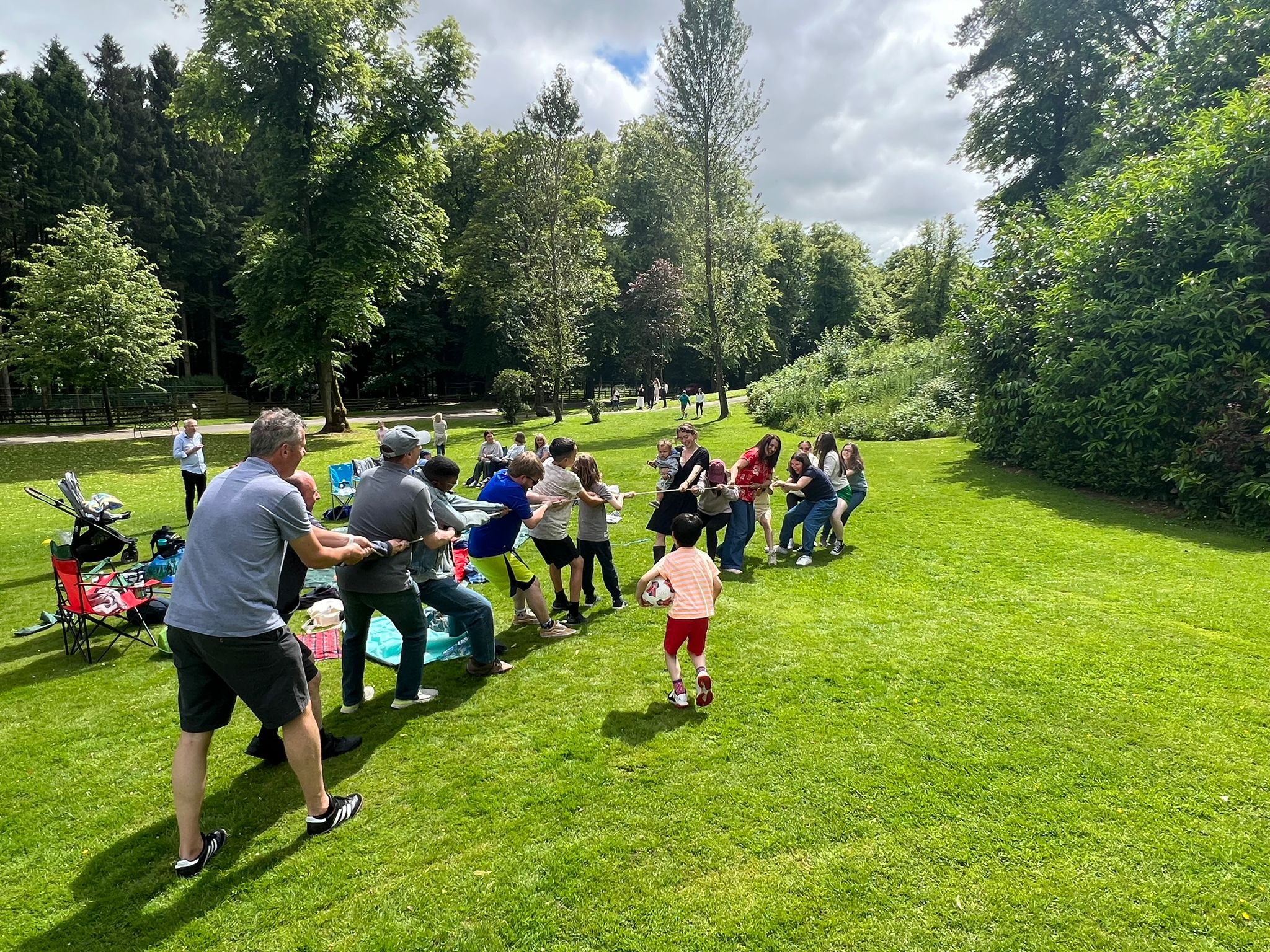
Or perhaps not...maybe even worse??! Even with Moses shouting encouragement from the side.
Can we call it a draw...??

The Little's showing their skipping skills...based on 25 years of when Susan says 'jump' Andrew jumps.
Hizkidz Holidays!!
The school summer holidays and our regular Hizkidz leaders and helpers are in need of a break!
We are looking for people who would be willing to run one off summer sessions during the Sunday service for our children as well as people who would be willing to take a turn in looking after our tiniest tots in creche. Full instructions, equipment and teaching materials will be provided. Please speak to Pauline or Susan Little if you can help on any of the dates:
Sunday 30th June, Sunday 6th July, Sunday 13th July, Sunday 20th July, Sunday 27th July and Sunday 3rd August.
Thanks
Pauline and Susan


What to watch?
A couple of suggestions for Summer viewing over the next few week.
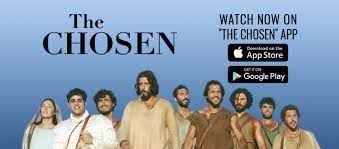
If you haven't watched The Chosen you might find it better than the usual Whodunnit investigation or a Dragon focused fantasy saga.
It is based around the story of Jesus in the Gospels and even though there is artistic licence (and it should be watched that way) there is so much which is taken directly from the Bible narrative - I know for some this might be tricky (do you like watching portrayals of the Lord like this? - if not, and it's not helpful, that's fine, give it a miss.)
But if you want to take a look they are on the Chosen App or you can watch on Youtube and Netflix etc.
Here is an article about the series.
Meanwhile at the movies...

...and the Need for Outside-In Wisdom
This is one of the Movies of the Summer - any with kids or grandkids at the right age may already be aware of the Inside Out movie - this is the sequel and it deals with what is more and more common with young people these days, ie that their emotions are so important - what you feel is key, and feeling certain about things gives them an authenticity.
This is an extract to Brett McCracken's review on the Gospel Coalition website and if you want to keep abreast of what the young ones are watching (and thinking about) this is a good start.
As I watched (and largely enjoyed) the film, it struck me that the Inside Out franchise makes vivid what’s assumed in our modern age of authenticity. We’re enchanted less by the world outside our heads and more by the “self” we conjure from the authentically messy menagerie within.
In an age of amorphous self-made identity, “God made me and knows me” is a far firmer foundation on which to build the self.
To be sure, emotional awareness and self-knowledge are part of a healthy identity. But so are convictions, beliefs, and worship oriented away from the self and accountable to truths far bigger than us. In the end, a healthy sense of self is formed not only from the inside out but also—and arguably more powerfully—from the outside in.
Read the article here.
Release International
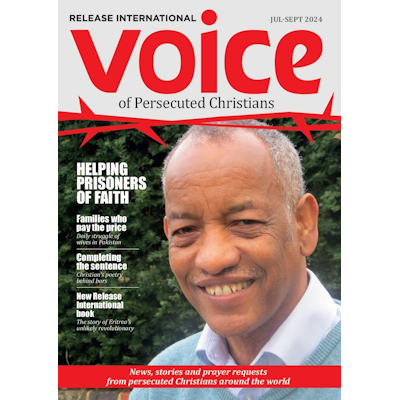
The latest magazine VOICE is available to read here and you can have it sent to your inbox each month by signing up and can keep up to date with the latest news about persecuted Christians.
Election Reflection
Seek Your City’s Good
Thus says the Lord of hosts, the God of Israel, to all the exiles whom I have sent into exile from Jerusalem to Babylon, “Build houses and live in them; and plant gardens, and eat their produce . . . And seek the welfare of the city where I have sent you into exile, and pray to the Lord on its behalf; for in its welfare you will have welfare. (Jeremiah 29:5–7)
If that was true for God’s exiles in Babylon, it would seem to be even more true for Christian exiles in this very “Babylonian” world. What, then, shall we do?
We should do the ordinary things that need to be done: build houses; live in them; plant gardens. This does not contaminate you if you do it all for the real King and not just for eye service as men-pleasers.
Seek the welfare of the place where God has sent you. Think of yourself as sent there by God. Because you are.
Pray to the Lord on behalf of your city. Ask for great and good things to happen for the city. Evidently God is not indifferent to its welfare. One reason he is not is this: In the welfare of the city his people find welfare.
This does not mean we give up our exile orientation. In fact we will do most good for this world by keeping a steadfast freedom from its beguiling attractions. We will serve our city best by getting our values from the “city which is to come” (Hebrews 13:14). We will do our city most good by calling as many of its citizens as we can to be citizens of the “Jerusalem above” (Galatians 4:26).
Let’s live so that the natives will want to meet our King.
From Bible Gateway daily reflection
SU Holidays

Jacob is involved in an SU holiday in Arran this year - 6-13th July
Click
here to read more about what is happening and a helpful list of things to inform our prayers!
Ladybird Book of Mearns Free Church
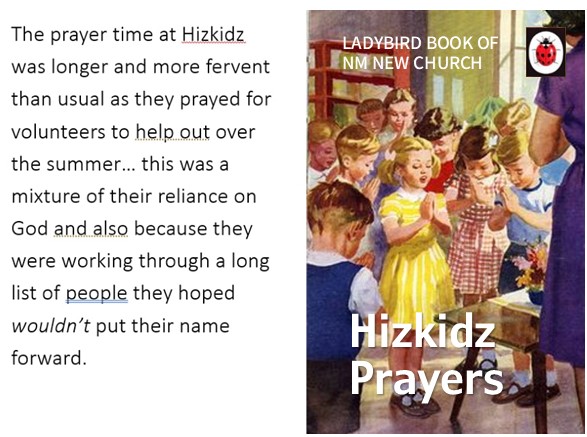
Mearns Free Church
Community Week
5th - 9th August
 The Paris 2024 Olympics marks 100 years since Eric Liddell famously won the 400 metres in the 1924 Paris Olympics.
The Paris 2024 Olympics marks 100 years since Eric Liddell famously won the 400 metres in the 1924 Paris Olympics.
Join us for a week of activities for all ages as we explore more about the life and faith of a Scottish sporting legend whose heart lay in China.
All activities will take place at Belmont House School, home of Mearns Free Church, and are free to attend.
FULL MONDAY TO FRIDAY PROGRAMME CAN BE SEEN HERE.
Safeguarding in Mearns Free Church

One of our priorities now that we are in the Free Church is to ensure that we comply with the Free Church’s safeguarding policy and processes. Our safeguarding team is here to help everyone to do what is required; our safeguarding team comprises Sue Anderson (Safeguarding Coordinator) and Ian Forgie (Deputy Safeguarding Coordinator) assisted by Marlene Smith, Sue Amery-Behr and Alastair McLellan.
WHAT IS THE GOSPEL?
We are in part 5 of a new series looking at aspects of the Gospel. Don Carson has a short booklet based on this exposition of 1 Corinthians 15:1-19 from the plenary address at The Gospel Coalition's inaugural public conference in 2007
You can buy it here.
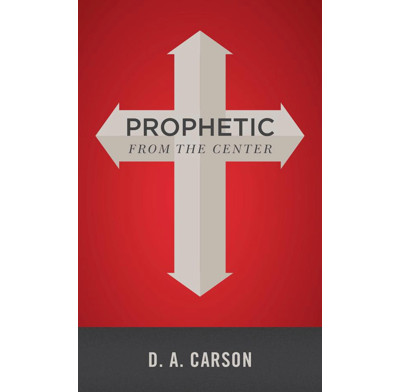
I shall try to bring things to clarity by focusing on eight summarizing words (six of which were first suggested by John Stott), five clarifying sentences, and one evocative summary.
1. The Gospel Is Christological; It Is Christ-Centered
2. The Gospel is Theological
3. The Gospel Is Biblical
4. The Gospel is Apostolic
5. The Gospel Is Historical
Here four things must be said.
First, 1 Corinthians 15 specifies both Jesus’s burial and his resurrection. The burial testifies to Jesus’s death, since (normally!) we bury only those who have died; the appearances testify to Jesus’s resurrection. Jesus’s death and his resurrection are tied together in history: the one who was crucified is the one who was resurrected; the body that came out of the tomb, as Thomas wanted to have demonstrated, had the wounds of the body that went into the tomb. This resurrection took place on the third day: it is in datable sequence from the death. The cross and the resurrection are irrefragably tied together. Any approach, theological or evangelistic, that attempts to pit Jesus’s death and Jesus’s resurrection against each other, is not much more than silly. Perhaps one or the other might have to be especially emphasized to combat some particular denial or need, but to sacrifice one on the altar of the other is to step away from the manner in which both the cross and resurrection are historically tied together.
Second, the manner by which we have access to the historical events of Jesus’s death, burial, and resurrection, is exactly the same as that by which we have access to almost any historical event: through the witness and remains of those who were there, by means of the records they left behind. That is why Paul enumerates the witnesses, mentions that many of them are still alive at his time of writing and therefore could still be checked out, and recognizes the importance of their reliability. In God’s mercy, this Bible is, among many other things, a written record, an inscripturation, of those first witnesses.
Third, we must see that, unlike other religions, the central Christian claims are irreducibly historical. If somehow—I have no idea how—you could prove that Gautama the Buddha never lived, would you destroy the credibility of Buddhism? No, of course not. The plausibility and credibility of Buddhism depends on the internal coherence and attractiveness of Buddhism as a system with all its variations. It depends not a whit on any historical claim. If somehow—I have no idea how—you could prove that the great Hindu god Krishna never existed, would you destroy Hinduism? No, of course not. If the ancient Greeks had thousands of gods, Hindus have millions, and the complex vision of Hinduism in which all reality is enmeshed in one truth with its infinite variations and its karmic system of retribution and cyclic advance and falling away depends in no way on the existence of any one of them. If Krishna were to disappear from the Hindu pantheon, you could always go down the street to a Shiva temple instead. Suppose, then, that you approach your friendly neighborhood imam and seek to explore how tightly Islam is tied to historical claims. You will discover that history is important in Islam, but not the same way in which it is important in biblically faithful Christianity. You might ask the imam, “Could Allah, had he chosen to do so, have given his final revelation to someone other than Muhammed?” Perhaps the imam will initially misunderstand your question. He might reply, “We believe that God gave great revelation to his prophet Abraham, and great revelation to his prophet Moses, and great revelation to his prophet Jesus. But we believe Allah gave his greatest and final revelation to Muhammed.” You might reply, “With respect, sir, I understand that that is what Islam teaches; and of course you will understand that I as a Christian do not see things quite that way. But that is not my question. I am not asking if Muslims believe that God gave his greatest and f inal revelation to Muhammed: of course you believe that. I am asking, rather, a hypothetical question: Could God have given his greatest and final revelation to someone other than Muhammed, had he chosen to do so?” Your thoughtful imam will doubtless say, “Of course! Allah, blessed be he, is sovereign. He can do whatever he wishes. The revelation is not Muhammed! Muhammad is not involved in the drafting of the Qur’an, except to record the word of Allah. Revelation is entirely in the gift of Allah. Allah could have given it to anyone to whom he chose to give it.But we believe that in fact Allah gave it to Muhammed.” In other words, although it is important to Muslims to believe and teach that the ultimate revelation of Allah was given, in history, to Muhammed, and Islam’s historical claims regarding Muhammed are part and parcel of its apologetic to justify Muhammed’s crucial place as the final prophet, there is nothing intrinsic to Muhammed himself that is bound up with the theological vision of Islam. Otherwise put, a Muslim must confess that there is no God but Allah, and that Muhammed is his prophet, but Muhammed’s historical existence does not, in itself, determine the Muslim’s understanding of God.
But suppose you were to ask a similar question of an informed Christian pastor: “Do you believe that the God of the Bible might have given his final revelation to someone other than Jesus of Nazareth?” The question is not even coherent—for Jesus is the revelation, the revelation that entered history in the incarnation. As John puts it in his first letter, “That which was from the beginning, which we have heard, which we have seen with our eyes, which we have looked at and our hands have touched—this we proclaim concerning the Word of life. The life appeared, we have seen it and testify to it” (1 John 1:1–2). This is an historical revelation. Moreover, there are specific historical events in Jesus’s life that are essential to the most elementary grasp of Christianity—and here, pride of place goes to Jesus’s death and resurrection. Several years ago, a reporter put a crucial question to the then Anglican archbishop of Perth, at the time the Anglican primate of Australia. The reporter asked, “If we discovered the tomb of Jesus, and could somehow prove that the remains in the tomb were Jesus’s remains, what would that do to your faith?” The archbishop replied that it wouldn’t do anything to his faith: Jesus Christ has risen in his heart. The apostle Paul understands the issues with much more straightforward clarity: if Christ has not risen, your faith is futile (1 Cor. 15:17). In other words, part of the validation of faith is the truthfulness of faith’s object—in this case, Jesus’s resurrection. If Jesus has not risen, they can believe it ‘till the cows come home, but it is still a futile belief that makes them look silly: they “are to be pitied more than all men” (15:17). There is no point getting angry with the former archbishop of Perth: he and his opinions on this matter are painfully pitiful. Many in our culture believe that the word “faith” is either a synonym for “religion” (e.g. “there are many faiths” means “there are many religions”), or it refers to a personal, subjective, religious choice. It has nothing to do with truth. But in this passage, Paul insists that if Christ is not risen, then faith that believes Christ is risen is merely futile. Part of the validation of genuine faith is the reliability, the truthfulness, of faith’s object. If you believe something is true when in reality it is not true, your faith is not commendable; rather, it is futile, valueless, worthless, and you yourself are to be pitied. Part of the validation of faith is the truthfulness of faith’s object—and in this case, the object is an historical event, the resurrection of Jesus Christ. The Bible never asks us to believe what is not true. By the same token, one of the principal ways the Bible increases and strengthens faith is by articulating and defending the truth.
We are not saved by theological ideas about Christ; we are saved by Christ himself.
There is another way of clarifying the relationship between a biblically faithful Christianity and history. Not too long ago, the members of the New Testament department at Trinity Evangelical Divinity School were interviewing a possible addition to our department. The candidate was a fine man with years of fruitful pastoral ministry behind him and an excellent theological education.A problem came to light, however, when we inquired how he would respond to students raising questions about a variety of perceived historical difficulties in the Gospels. In every case, he thought the way forward was to talk about the theological themes of Matthew, or the biblical theology of Mark, or the literary structure of Luke, and so forth. He simply set aside the historical questions; he ignored them, preferring to talk exclusively in terms of literary and theological themes. In due course we told him that he did not have a ghost of a chance of joining our department as long as he held to such an approach. For although it is entirely right to work out the theology of Matthew’s Gospel, that must not be at the expense of refusing to talk about the historical person of Jesus Christ. The candidate’s procedure gives the impression we are saved by theological ideas about Christ; it is an intellectualist approach, almost a gnostic approach, to salvation. But we are not saved by theological ideas about Christ; we are saved by Christ himself. The Christ who saves us is certainly characterized by the theological realities embraced by Matthew, Mark, Luke, and John, but this Christ is extra-textual; he is the historical God-man to whom the text bears witness.
Continued next week...
B.Y.O.C. please

CAN YOU HELP?
it makes such a difference if people bring their own cups rather than using the disposable ones each week - can you help?

Mearns Free Church has a What's App Group for Prayer
Here are some details on what it is about... read to the bottom and then find out how you can be involved...
Purpose: A platform to share information regarding a sudden need of prayer
Speak to Margaret Boyd if you would like to be added to this group or email your details to mandmboyd@hotmail.co.uk
You need WhatsApp on your phone to get set up.